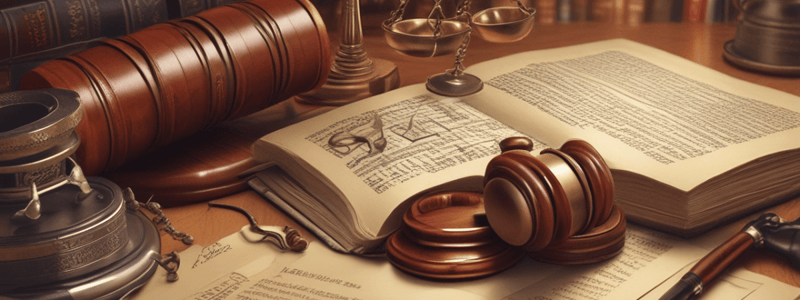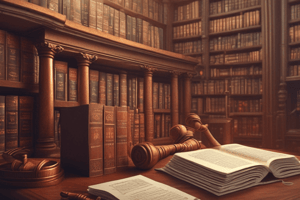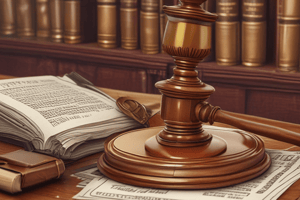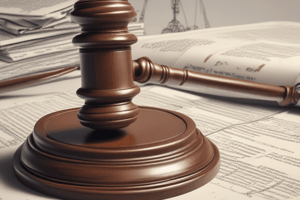Podcast
Questions and Answers
Which level of government is responsible for enacting provincial acts?
Which level of government is responsible for enacting provincial acts?
- Municipal councils (local)
- Parliament (national)
- Provincial legislatures (provincial) (correct)
- Subordinate legislators
What is the key defining feature of subordinate legislation?
What is the key defining feature of subordinate legislation?
- It is enacted by municipal councils.
- It is enacted by the national Parliament.
- It is enacted by a person or body under the authority granted by primary legislation. (correct)
- It is enacted by provincial legislatures.
Which of the following is a true statement about the relationship between primary and subordinate legislation?
Which of the following is a true statement about the relationship between primary and subordinate legislation?
- Subordinate legislation cannot be in conflict with its enabling original legislation. (correct)
- Subordinate legislators can issue subordinate legislation beyond the framework of the authority granted to them by the enabling legislation.
- If the enabling Act is declared unconstitutional, the delegated legislation will continue to exist.
- If the enabling Act is repealed, the delegated legislation will continue to exist unless the new Act expressly provides otherwise.
What is the consequence if the enabling Act for subordinate legislation is declared unconstitutional?
What is the consequence if the enabling Act for subordinate legislation is declared unconstitutional?
What is the rule regarding the repeal or amendment of legislation?
What is the rule regarding the repeal or amendment of legislation?
What is the relationship between the repeal of an enabling Act and the fate of the subordinate legislation?
What is the relationship between the repeal of an enabling Act and the fate of the subordinate legislation?
What is the primary source of legislation according to the text?
What is the primary source of legislation according to the text?
Which type of legislation was common law and therefore abrogated by disuse?
Which type of legislation was common law and therefore abrogated by disuse?
What must happen for legislation to be repealed?
What must happen for legislation to be repealed?
During which era did legislation exist between the union and democratic era?
During which era did legislation exist between the union and democratic era?
Where does old-order legislation still apply geographically according to the text?
Where does old-order legislation still apply geographically according to the text?
What is the highest level in the hierarchical order of legislation?
What is the highest level in the hierarchical order of legislation?
What is the primary distinction between a process and a procedure?
What is the primary distinction between a process and a procedure?
What is the difference between existing law and vested rights?
What is the difference between existing law and vested rights?
What is the primary distinction between an act and an act in legal terminology?
What is the primary distinction between an act and an act in legal terminology?
What is the primary distinction between constitutionality and the rule of law?
What is the primary distinction between constitutionality and the rule of law?
What is the primary distinction between legitimacy and legality?
What is the primary distinction between legitimacy and legality?
What is the primary distinction between codified and uncodified law?
What is the primary distinction between codified and uncodified law?
According to the principle established in the case of Executive Council Western Cape Legislature v President of the RSA, which of the following statements is true?
According to the principle established in the case of Executive Council Western Cape Legislature v President of the RSA, which of the following statements is true?
Which of the following is the correct hierarchy of sources of law in South Africa?
Which of the following is the correct hierarchy of sources of law in South Africa?
Which of the following is NOT considered legislation according to the information provided?
Which of the following is NOT considered legislation according to the information provided?
What is the reason given for why common law, case law, practice and interpretation notes, explanatory memoranda, policy documents, departmental memoranda, uncodified indigenous law, legal opinions, circulars, and resolutions of Parliament are NOT considered legislation?
What is the reason given for why common law, case law, practice and interpretation notes, explanatory memoranda, policy documents, departmental memoranda, uncodified indigenous law, legal opinions, circulars, and resolutions of Parliament are NOT considered legislation?
According to the information provided, which of the following statements is correct regarding Parliament's power over subordinate legislation?
According to the information provided, which of the following statements is correct regarding Parliament's power over subordinate legislation?
What does the term 'law of general application' refer to according to the information provided?
What does the term 'law of general application' refer to according to the information provided?
Flashcards are hidden until you start studying
Study Notes
Legislation
- Legislation is written law enacted by a person or body with the authority to do so by the Constitution or legislation.
Characteristics of Legislation
- Legislation remains in force until repealed or amended by a competent lawmaker or invalidated by a competent court.
Types of Legislation
- Chronological legislation:
- Before 1806 (e.g. Placaats) = common law and therefore abrogated by disuse
- Old-order legislation (1806-1994) = repealed/amended by legislature or declared unconstitutional and invalid by court
- Legislation since 1994
- Geographical:
- Old-order legislation was originally enacted and envisaged for a map that is different from what South Africa looks like now
- Provincial Ordinances and legislation of the former TBVC states are still applicable to the old geographical areas of the former provinces and homelands until repealed/amended by legislature or declared unconstitutional by a competent court
- Hierarchical:
- Constitution (lex fundamentalis)
- Original/primary legislation:
- Enacted by a democratically elected body during a plenary session, in accordance with an authority/legislative power derived directly or indirectly from the Constitution
- Examples: Acts of Parliament, Provincial Acts, municipal by-laws (excluding pre-1994)
- Subordinate/delegated legislation:
- Enacted by a person or body under the authority of a power granted by primary legislation
- Examples: provincial proclamations, ministerial regulations, university statutes
Principles of Subordinate Legislation
- Subordinate legislation cannot be in conflict with its enabling original legislation
- Subordinate legislators can only issue subordinate legislation within the framework of the authority specifically bestowed on them by the enabling legislation
- If the enabling Act is declared unconstitutional, delegated legislation will cease to exist, unless the court orders otherwise
- If the enabling Act is repealed, delegated legislation will cease to exist, unless the new Act expressly provides otherwise
- Only the fit and proper legislature can repeal or amend its own legislation
- Parliament cannot delegate the power to amend or repeal an Act of Parliament to a subordinate legislator
- Parliament cannot repeal or amend subordinate legislation, but they can repeal the empowering Act
Studying That Suits You
Use AI to generate personalized quizzes and flashcards to suit your learning preferences.



